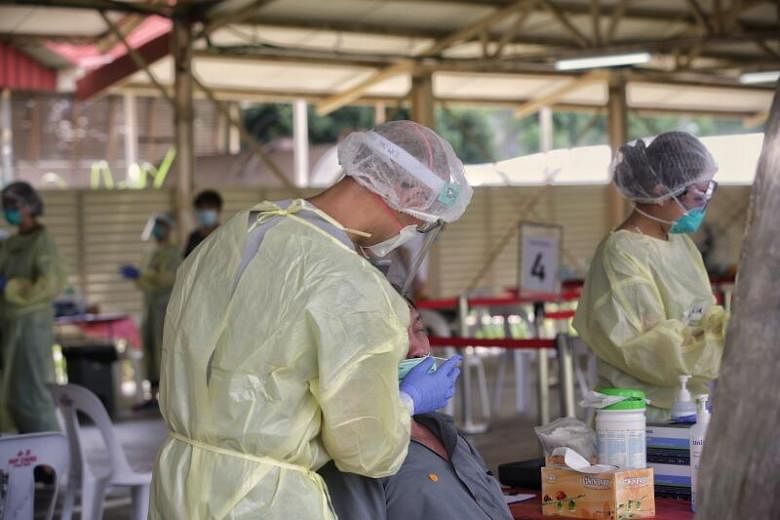SINGAPORE - From the analysis of community cases, 40 per cent of confirmed Covid-19 cases here continued to engage in community activities after the onset of symptoms, said Health Minister Gan Kim Yong on Friday (July 24).
Such behaviour jeopardises efforts to fight Covid-19 here, said Mr Gan, who urged people to see a doctor if unwell and to stay home during medical leave or till swab results return negative.
He also said the Health Ministry (MOH) has been stepping up its surveillance, active case finding and containment efforts in order to detect and ringfence cases of infection as early as possible.
This comes as unlinked cases in the community continue to be uncovered, although the prevalence remains low at three cases in the past week despite extended testing criteria to test all individuals aged 13 and above with acute respiratory infections.
Mr Gan said that when infection clusters arise, the ministry takes swift action to quarantine and test close contacts and carry out swab operations.
"We are now on a good footing, but this can easily change if there is a big cluster which may spawn second or third generations of infection. This is why MOH has been actively identifying high risk settings to aggressively test and contact trace cases," said Mr Gan, who co-chairs a multi-ministry task force tackling the coronavirus pandemic here.
"When we detect cases, we draw large rings around them to isolate contacts and prevent transmission," he added.
Over the past months, seven swab operations were conducted for workplace clusters that newly emerged, such as Keppel Shipyard and Northpoint City.
More than 1,300 workers from these two workplaces were tested and two positive cases were uncovered in addition to six cases who were tested after being placed in quarantine as close contacts with confirmed cases.
"Beyond the workplaces, we also launched swab operations to test individuals at retail premises frequented by multiple positive cases," said Mr Gan.
Close to 60 Sheng Siong supermarket staff members at New World Centre and over 40 employees at Haniffa supermarket in Dunlop Street were tested, and none of the workers tested positive.
Fifty-eight households residing at Block 111 Tampines Street 11 were also placed under phone surveillance and were tested for Covid-19 along with their visitors as a precautionary measure after confirmed cases were found in two households in the block in late June.
No new cases have been detected so far at Block 111, said the Health Ministry.
The ministry said it has been using a combination of different testing methods to pick up early signals of emerging clusters.
The National Environment Agency's (NEA) waste-water testing allows monitoring of the situation in densely populated residential premises, it said.
This waste-water surveillance is currently implemented at 34 dormitories.
"NEA has started to trial waste-water monitoring in other settings and is planning to progressively expand such surveillance to include more workers' dormitories and other populous living quarters such as nursing homes and hostels," added the ministry.












